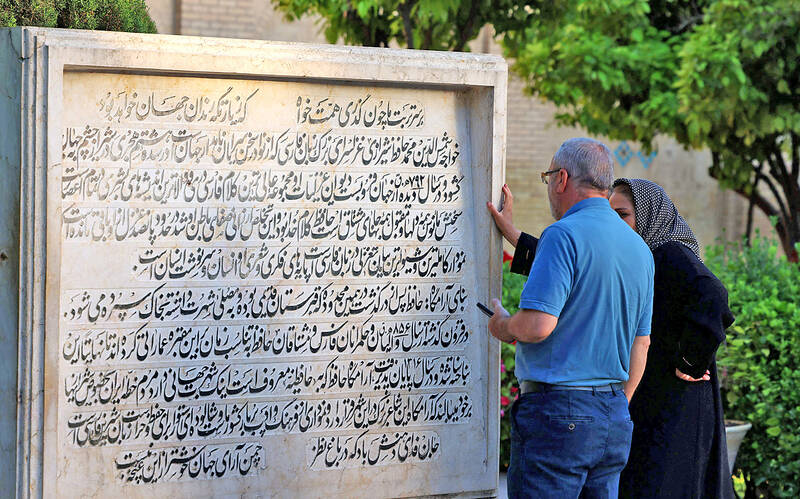When Iranians worry about life’s big questions, many seek answers in the works and wisdoms of Persia’s most revered poet, Hafez — sometimes with the help of a parakeet.
Retired housewife Mitra, 61, had questions about whether her son married the right woman, so she went to the tomb of Iran’s beloved 14th-century bard in the southern city of Shiraz.
Seeking guidance, she visited a fortune teller, one of many who offer advice with the help of Hafez’s collected works, a book of odes known as The Divan.

Photo: AFP
After sharing her concern, Mitra watched anxiously as the fortune teller thumbed through the thick tome, opened it on a random page and pointed his finger at one verse. He read it out and explained its metaphors and mystical insights.
Mitra’s face lit up — the message was positive, and domestic harmony lay ahead.
“I finally did the consultation today for my son, because I had doubts on whether his marriage was a good decision,” she said in the garden of the Tomb of Hafez.
“I finally regained hope,” she said after the nod of approval for her daughter-in-law from within Iran’s ancient lyrical treasure trove.
Some Iranian fortune tellers, known as falgir, offer a special service to truly randomize the selection of the all-important Hafez verse.
Chirpy parakeets known as “love birds” hop across stacks of colorful envelopes that contain his enigmatic poems and pick one out with their tiny beaks.
As Hafez devotees thronged into the mausoleum to pay their respects, another person seeking advice was Hamidah, a 44-year-old chemistry professor.
“I always ask Hafez for help and consult him,” she said. “I can’t explain this with the laws of physics, but it’s a reality for me.”
Poetry enjoys immense popularity in Iran, where timeless verses on love and spirituality can be found woven into carpets, engraved in jewelry and emblazoned on street billboards.
The nation prides itself on its masters such as Rumi, Saadi, Khayyam and Ferdowsi, who wrote the epic Book of Kings, preserving Iran’s pre-Islamic heritage through mythical tales and legends.
“They are our national figures and the creators of our culture,” said Farshad, a 41-year-old doctor.
Early 20th-century poetry gave voice to social protest and faced censorship under the former monarchy, including the works of dissident poets Ahmad Shamlou, Forough Farrokhzad and Simin Behbahani.
However, no Iranian poet has enjoyed enduring and universal adoration like Hafez, and a well-worn copy of his Divan compendium is found in most households.
People from all walks of life regularly cite his lyrical wisdoms, mostly on the themes of love and wine and ironic takes on the hypocrisy of holy men.
His poetry is recited during Nowruz, the New Year, and other celebrations such as the winter solstice festival.
“We start the year with the poems of Hafez,” said Maryam Youssefi, a 46-year-old housewife, for advice on what it “has in store for us.”
Fortune tellers can be found across Iran, but especially at his tomb, set amid rose gardens in Shiraz, 800km south of Tehran.
The tradition of Hafez bibliomancy — using his ancient wisdoms for divination and guidance — is known as Fal-e Hafez.
Hafez lived during a turbulent era of Persia’s history, and his contemplative verses often spoke of pain and human suffering, as well as religious hypocrisy.
His influences can be found far beyond Iran in the works of Johann Wolfgang von Goethe and Ralph Waldo Emerson, among others. Hafez has remained a venerated figure after the 1979 Iranian Revolution, even if some senior clerics have voiced disapproval of the Fal-e Hafez tradition.
In the past few years, one criticized it as out of line with Islamic Sharia law and urged people against “following Hafez’s divinations.”
Nonetheless, devotees keep flocking to Shiraz, and Hafez poetry reading sessions still draw large crowds, while the divination custom remains alive and well.
Many Iranians swear by it while others “practice the tradition without really believing in it,” said Ahmad Akbarpour, a writer and poet from Shiraz.
Mostafa Eskandari, a 67-year-old fortune teller, said he learned Hafez’s poetry by heart and has been interpreting it for more than 30 years.
“Hafez’s poems are ambiguous and multifaceted. They can be interpreted in different ways,” he said.
Yet the master of old speaks to everyone individually, he said.
“If a thousand people each set an intention and open the book of odes together, each will receive a different response,” he said.

The death of a former head of China’s one-child policy has been met not by tributes, but by castigation of the abandoned policy on social media this week. State media praised Peng Peiyun (彭珮雲), former head of China’s National Family Planning Commission from 1988 to 1998, as “an outstanding leader” in her work related to women and children. The reaction on Chinese social media to Peng’s death in Beijing on Sunday, just shy of her 96th birthday, was less positive. “Those children who were lost, naked, are waiting for you over there” in the afterlife, one person posted on China’s Sina Weibo platform. China’s

‘NO COUNTRY BUMPKIN’: The judge rejected arguments that former prime minister Najib Razak was an unwitting victim, saying Najib took steps to protect his position Imprisoned former Malaysian prime minister Najib Razak was yesterday convicted, following a corruption trial tied to multibillion-dollar looting of the 1Malaysia Development Berhad (1MDB) state investment fund. The nation’s high court found Najib, 72, guilty on four counts of abuse of power and 21 charges of money laundering related to more than US$700 million channeled into his personal bank accounts from the 1MDB fund. Najib denied any wrongdoing, and maintained the funds were a political donation from Saudi Arabia and that he had been misled by rogue financiers led by businessman Low Taek Jho. Low, thought to be the scandal’s mastermind, remains

Australian Prime Minister Anthony Albanese yesterday announced plans for a national bravery award to recognize civilians and first responders who confronted “the worst of evil” during an anti-Semitic terror attack that left 15 dead and has cast a heavy shadow over the nation’s holiday season. Albanese said he plans to establish a special honors system for those who placed themselves in harm’s way to help during the attack on a beachside Hanukkah celebration, like Ahmed al-Ahmed, a Syrian-Australian Muslim who disarmed one of the assailants before being wounded himself. Sajid Akram, who was killed by police during the Dec. 14 attack, and

VISHNU VANDALS: A Cambodian official accused Thailand of destroying a statue in a disputed border area, with video showing the Hindu structure being torn down The Thai military said ceasefire talks with Cambodia, set to begin yesterday, are expected to conclude with a meeting of the countries’ defense ministers on Saturday, as the two sides seek to end weeks of deadly clashes. The talks started at 4pm in Thailand’s Chanthaburi Province, which borders Cambodia. The Thai Ministry of Defense outlined several demands to be discussed ahead of the bilateral meeting of the General Border Committee (GBC) on Saturday. If secretariat-level discussions fail to reach agreement on key technical frameworks such as troop deployments, the Thai side would not proceed with the GBC meeting or sign any agreement on